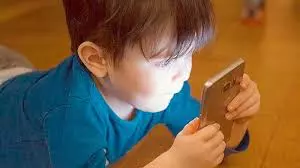Phone Addiction Triggers Mental Health Crisis Among Kids
Experts say children increasingly use screens to escape deeper psychological stressors—family conflict, bullying, or academic pressure.

Hyderabad: A nine-year-old boy in Hyderabad held a knife to his throat and threatened suicide after his parents took away the mobile phone he had been using to play a game. The disturbing incident underscores a growing crisis—digital addiction among children and adolescents.
Doctors warn that mobile dependency is fuelling mental health emergencies, including aggression, emotional instability and suicidal thoughts. A global study in Psychological Bulletin found a strong correlation between screen time and behavioural issues in children—such as depression, anxiety, aggression and hyperactivity. Worryingly, the relationship is cyclical: emotional distress increases screen use, which worsens the distress.
“We are seeing clear withdrawal symptoms in children when phones are taken away—similar to substance addiction,” said Dr Hrishikesh Giri Prasad, associate professor of child psychiatry at Niloufer Hospital. “It often begins with homework, slowly builds into dependency and eventually spirals into addiction. Sleep suffers, academics decline and irritability leads to aggression or self-harm.”
Many screen-addicted children binge on short video reels and aspire to become influencers. Some are exposed to pornography. “They may cut themselves, throw objects or threaten suicide. Physical violence—often directed at mothers—is not uncommon,” Dr Prasad said.
Experts say children increasingly use screens to escape deeper psychological stressors—family conflict, bullying, or academic pressure. “Failure to get likes or followers can cause anxiety. Some go to unethical lengths to become influencers,” he added.
In extreme cases, children express suicidal thoughts. The content they consume also matters—emotionally disturbing or offensive material can trigger breakdowns. Dr Prasad stressed the need for strict parental supervision. “Adolescents should not have phones. Parents often underestimate the harm, and it usually starts with excuses related to studies. Many are easily manipulated.”
He urged parents to watch for early signs of addiction—mood swings, poor academic performance, sleep disturbances, irritability, and withdrawal. “Children must feel emotionally safe with their parents. They need to learn that freedom comes with responsibility.”
Recent data from the ministry of statistics shows 80.7 per cent of rural boys aged 15+ and 48.4 per cent of girls own a mobile phone. Internet use is also high—72.1 per cent of boys and 57.6 per cent of girls. However, only 16.8 per cent of boys and 8.3 per cent of girls know how to report cybercrimes. Urban figures are higher, but even there, only a third know how to report abuse.
The data reveals not just a gender divide but also poor digital literacy. Younger children, aged 6 to 10, are especially at risk as their emotional intelligence is still forming. “Children from low-income families often lack both emotional support and supervision. The issue isn’t the screen itself—it’s unregulated access without emotional grounding,” said Dr N. Hemalatha, clinical psychologist at KIMS Hospital.
She added that spending quality offline time with family and setting clear screen limits can reduce dependency. “Building emotional bonds and helping children through difficulties is more effective than banning screens outright.”
The risks of unsupervised online exposure are well-documented. TV shows like Adolescent depict how children fall into toxic digital spaces. In a real-life case, a young woman in the UK reportedly died by suicide after being influenced by an online group promoting self-harm.
“These cases are alarming but shouldn’t cause panic. The answer is not fear, but connection,” Dr Prasad explained. “Children deal with bullying, self-image issues, and peer pressure. If they can’t confide in their parents, they turn to unsafe digital spaces.”
As screens become ever-present, emotionally aware and responsive parenting is more vital than ever. Real connection remains the most powerful antidote to digital addiction. The nine-year-old who threatened suicide is now recovering. Both he and his parents are in therapy. Their relationship must heal—for his future depends on it,” Dr Prasad concluded.
Gfx points:
Screen addiction linked to aggression, sleep loss, and poor academics
Over 80% of rural boys aged 15+ own mobile phones
Only a fraction of teens know how to report online abuse
Excessive screen time tied to anxiety, depression, and self-harm
Solutions include therapy, family bonding, and regulated screen time

